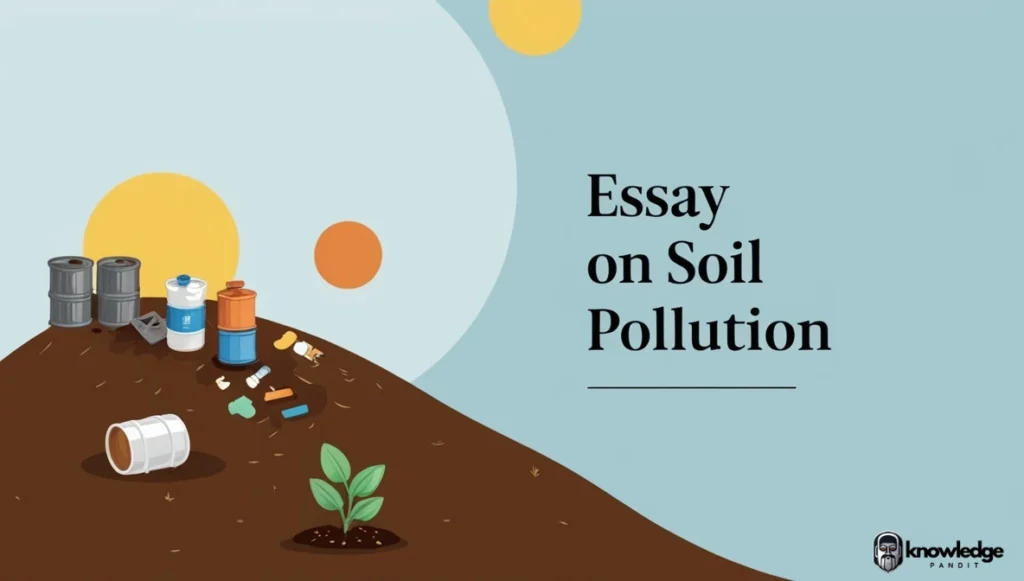Question: Write a 500+ word essay on Soil Pollution
Soil is an essential natural resource that supports life on Earth by providing the foundation for agriculture, plant growth, and ecosystems. However, increasing human activities have led to soil pollution, posing severe threats to the environment and biodiversity. Writing an essay on soil pollution sheds light on its causes, effects, and the urgent need to adopt sustainable practices to prevent further degradation. This “soil pollution essay” explores how we can protect this invaluable resource for future generations.
Answer:
What is Soil Pollution?
Soil pollution refers to the contamination of soil by harmful chemicals, pollutants, and waste materials. These substances alter the soil’s composition, making it toxic for plants, animals, and humans. Contaminants include pesticides, industrial waste, heavy metals, and plastics, which degrade soil quality and reduce its fertility.
Causes of Soil Pollution
Several factors contribute to soil pollution, including:
- Excessive Use of Chemical Fertilizers and Pesticides
- Over-reliance on chemical fertilizers and pesticides in agriculture results in the accumulation of harmful chemicals in the soil.
- These chemicals disrupt soil organisms, reduce fertility, and contaminate groundwater.
- Industrial Waste
- Improper disposal of industrial by-products, including heavy metals, oils, and chemicals, pollutes the soil in industrial areas.
- Factories and refineries release untreated effluents that seep into the ground, contaminating large areas.
- Plastic Waste
- Non-biodegradable plastics buried in landfills remain in the soil for hundreds of years, disrupting their natural composition.
- Microplastics further degrade soil health and harm organisms living within it.
- Deforestation
- Clearing forests for agriculture and urbanization exposes soil to erosion and depletes its nutrients.
- The lack of vegetation accelerates soil degradation and reduces its ability to recover.
- Mining Activities
- Mining disturbs the natural landscape and exposes soil to toxic chemicals, heavy metals, and acidic substances.
- Oil Spills
- Accidental spills during oil extraction, transportation, and storage contaminate soil, making it unsuitable for plant growth.
Effects of Soil Pollution
The consequences of soil pollution are far-reaching, affecting ecosystems, human health, and the economy.
- Impact on Agriculture
- Reduced soil fertility leads to lower crop yields, threatening food security.
- Crops grown in polluted soil may contain harmful chemicals, posing health risks to consumers.
- Loss of Biodiversity
- Contaminants in the soil harm microorganisms, insects, and plants, disrupting ecosystems.
- Reduced biodiversity affects the balance of nature and the services ecosystems provide.
- Health Risks to Humans
- Exposure to contaminated soil can cause skin diseases, respiratory problems, and even cancer.
- Pollutants like heavy metals can enter the food chain, accumulating in the bodies of humans and animals.
- Water Pollution
- Pollutants from soil seep into groundwater, contaminating drinking water sources.
- Runoff from polluted soil also affects rivers, lakes, and oceans.
Measures to Prevent Soil Pollution
Preventing soil pollution requires collective action from individuals, industries, and governments. Some effective measures include:
- Promoting Organic Farming
- Reduce the use of chemical fertilizers and pesticides by adopting organic farming practices.
- Use natural compost, crop rotation, and biological pest control methods.
- Waste Management
- Implement proper waste disposal systems to prevent the accumulation of harmful substances in the soil.
- Promote recycling and reduce the use of non-biodegradable materials like plastics.
- Afforestation and Reforestation
- Planting trees helps prevent soil erosion and restores degraded land.
- Forest cover improves the soil’s capacity to retain nutrients and water.
- Strict Industrial Regulations
- Enforce laws to regulate the disposal of industrial waste and ensure proper treatment of effluents.
- Encourage industries to adopt eco-friendly technologies and processes.
- Awareness Campaigns
- Educate communities about the importance of soil conservation and the harmful effects of soil pollution.
- Encourage responsible practices, such as reducing littering and avoiding the overuse of chemicals.
- Bioremediation
- Use microorganisms and plants to remove pollutants from the soil and restore its health.
- Techniques like phytoremediation are effective in treating contaminated land.
Soil Pollution in India
India faces significant soil pollution challenges due to rapid industrialization, urbanization, and agricultural practices. The improper disposal of waste, excessive use of pesticides, and deforestation have led to widespread soil degradation. Initiatives like Swachh Bharat Abhiyan and the National Mission for Sustainable Agriculture aim to combat soil pollution and promote sustainable land management practices.
Conclusion
Soil pollution is a grave environmental concern that requires immediate attention. By understanding its causes and effects, we can take proactive steps to preserve this invaluable resource. Governments, industries, and individuals must work together to implement sustainable practices, enforce regulations, and raise awareness about soil conservation. Writing this “essay on soil pollution” emphasizes the importance of protecting our soil to ensure a healthier planet and a better future for generations to come.
Explore More:
- Cow Essay in English
- Health is Wealth Essay
- Education Essay
- Environment Essay
- Global Warming Essay
- My Best Friend Essay
Stay curious, stay informed! Keep exploring with Knowledge Pandit because Knowledge is Power.




